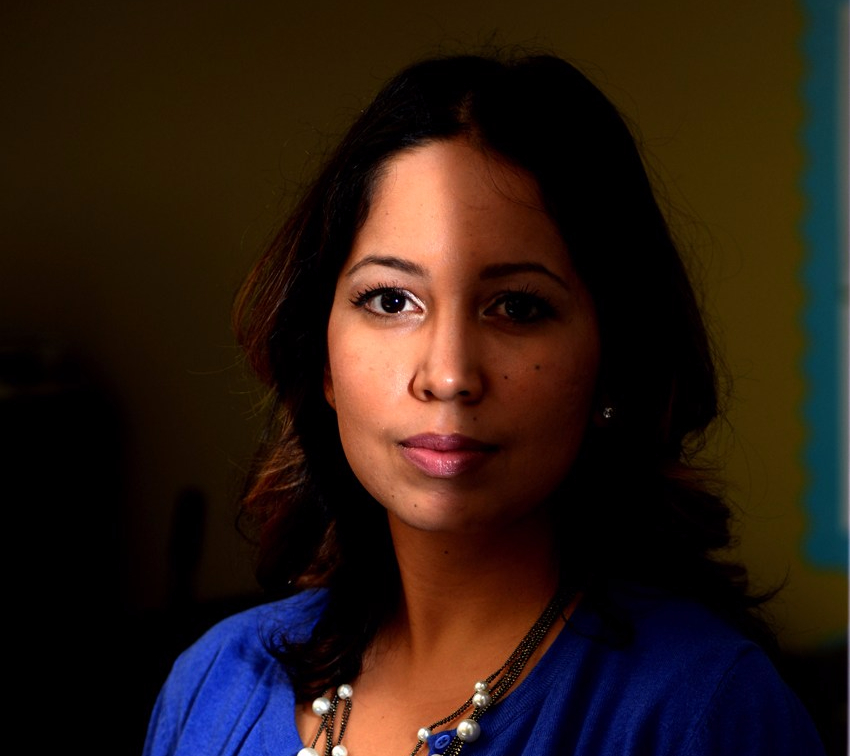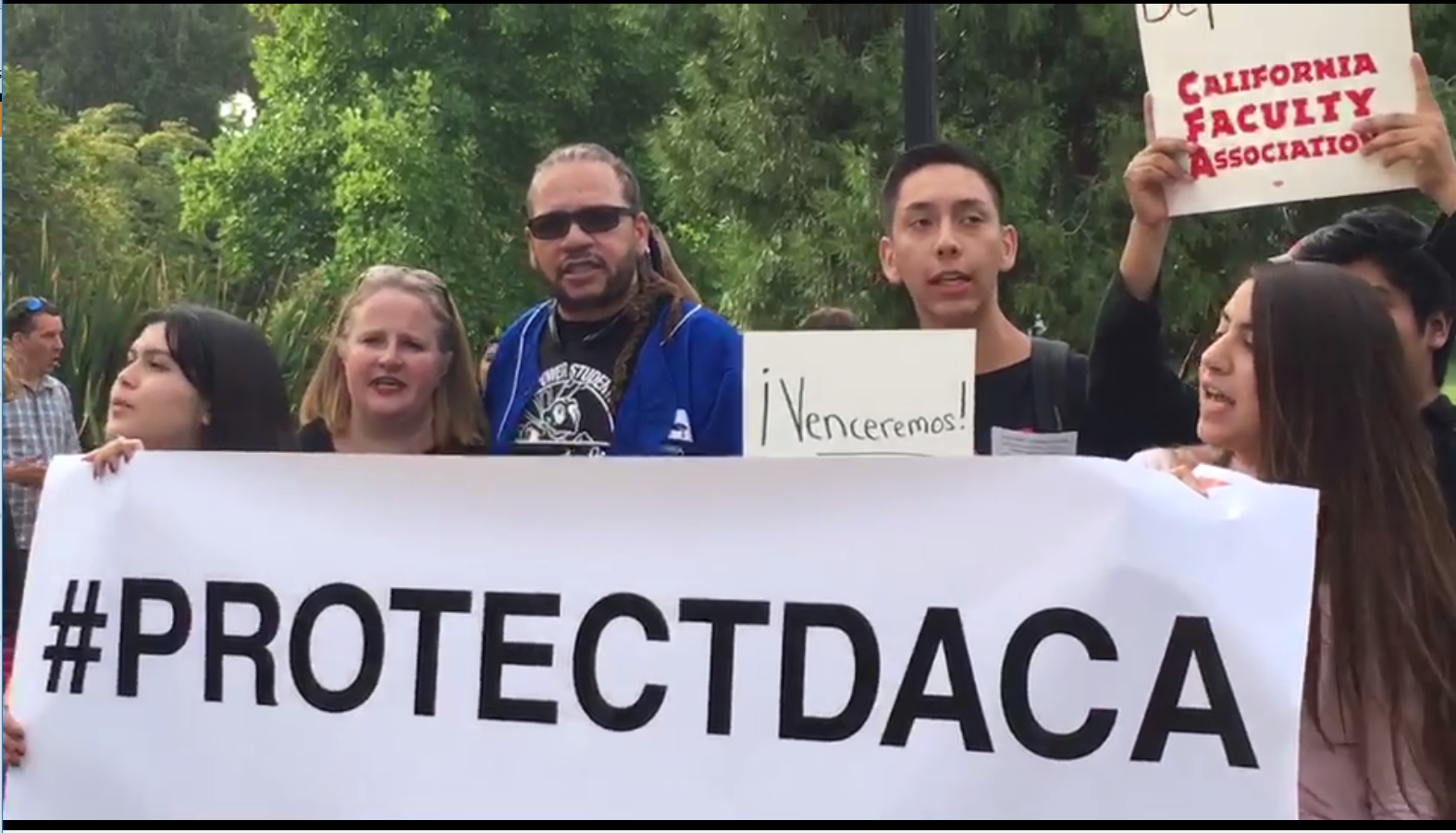
Photo by Scott Buschman
In Felicidad’s classroom hangs a “Dreamers Welcome” poster. Sometimes her students confide that they are Dreamers, among the estimated 800,000 immigrants who were either brought to America by their parents or crossed the border as teens without documentation.
On occasion, she has shared that she is also a Dreamer and enrolled in DACA (Deferred Action for Childhood Arrivals), a program authorized by President Obama’s executive order in 2012 providing deportation relief to undocumented immigrants who entered the country before age 16. Those who qualify can get a work permit or enroll as a student, but must reapply every two years.
Felicidad (not her real name) is a CTA member and high school math teacher in San Bernardino County. She does not want to be identified because she fears that being in the limelight could bring her to the attention of authorities, even though she is registered with the government, or that media attention will spark negative reactions from others.
“As soon as people find out I’m in DACA, they view me differently,” she explains. “Some people think I shouldn’t be here. Many are empathetic.”
President Trump announced an end to DACA on Sept. 5, but has indicated willingness to work with Democrats to extend DACA protections. For Felicidad, the past few weeks have been a nightmare as she struggles to cope with fear and anxiety over an uncertain future. She is one of thousands of teachers in California schools enrolled in DACA. Here is her story.
I have always felt fear. Fear of being separated from my family, my home and what I know. I came to this country at the age of 5 from Mexico. I had to learn a new language and assimilate to a different culture from the one I had known.
As a young child, my mother always emphasized the importance of an education. She would repeatedly tell me that my only job was to go to school and get good grades. I eventually graduated third in my high school class.
Nevertheless, I knew there was no better choice I could make than to pursue a higher education. I paid for every bit of my postsecondary education out of pocket. Every single dime. Friends of my family would say, “Why are you spending money on going to school if you are not going to be able to work?” In my mind, I have always believed education is something nobody can take away from you.
As Dreamers, we are not looking to be given anything other than the opportunity to give back to the country that has given us so much.
In June 2012, I graduated with a bachelor’s degree in math from Cal Poly Pomona. Days after my graduation, President Obama announced DACA. I couldn’t believe it. A couple of weeks after the program was in effect, I sent in my application, and two months later, I had in my hands the piece of paper that opened the doors to a sea of opportunities.
A few years later, I decided to go back to school and become a teacher. At eight months pregnant and with a 5-month-old baby in my arms, uncertain how I would pay for school, I started the credential and master’s program at the University of Redlands. I am now the first in my family to go to college and to have not one but two degrees. I’m in my third year in the classroom doing what I love — teaching math.
On Jan. 20, 2017, the fear I felt before DACA came back. I felt fear not only for myself and my family, but for my students and their families. Day in and day out, I have seen hateful comments on social media targeting immigrants — people who look like me and my students. It breaks my heart. The level of hate and lack of empathy is unfathomable.
The administration’s decision to rescind DACA is one that leaves 800,000 individuals in uncertainty, anguish and fear of what’s next. It also leaves thousands of young teens, who were waiting to turn 15 to apply for DACA, hopeless and heartbroken. Personally, these are the ones I worry about the most because this is the group of students that I teach. How can I ask them to recall principles of equality when they see no hope in their future?
As Dreamers, we are not looking to be given anything other than the opportunity to give back to the country that has given us so much. Just as native-born Americans had no choice or say in where they were born, neither did we Dreamers. We are undocumented through no fault of our own.
The choices we have made as young adults reflect our values — and they are values that reflect those of the country we call home. Many of us are teachers like myself, who work hard to educate the minds of the future. Others are nurses, lawyers, students and business owners employing Americans. We are not criminals. We are taxpayers. We are mothers and fathers of American citizens.
If I were to face deportation, I would emigrate to Canada. But why should I have to, when there is an increasing shortage of math teachers in this country, the country that has been my home for the past 23 years?
My hope is that those in Congress can see that this issue goes beyond politics. DACA affects real people like me who want nothing more than to serve and give back to this country and to live our lives without fear.
Stand Up for Dreamers!

Student CTA members and CTA Board members Susan Green and Toby Boyd (second and third from left, respectively) protest at the State Capitol in September. Among their calls: “If you don’t let us dream, we won’t let you sleep.”
Make the call: Dial 855-764-1010 toll-free now to be connected to Congress. Tell them to pass the bipartisan Dream Act of 2017.
See neaedjustice.org/daca for ways you can help #ProtectDreamers and #DefendDACA. Additional tips and resources are at neaedjustice.org/daca-resources.
The Discussion 0 comments Post a Comment